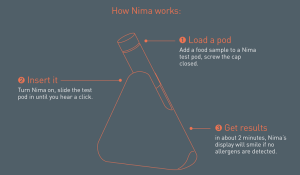Who has a dietary restriction or live with someone in that condition is always alert. Find out about innovative solutions to live and eat better.
We live reading all product labels, asking the waiter if that dish has this or that ingredient and then decide for its consumption. But making a decision based only on intuition is unreliable, because many people do not see the restriction as a matter of health.
A startup created by MIT students developed Nima, a machine that tests immediately if the food contains gluten. A version for dairy and peanuts will be available soon. The machine is fairly accurate, carries out the analysis in two minutes and fits in your pocket.

To make the analysis one should add the food sample in the tube, turn the machine on and wait for the result appear on the screen. The science behind this is based on immunoassay. The immunoassay is already used in laboratories for a long time, but this time it was planned to the final consumer use. Within the disposable cartridge that is placed in the tube there are antibodies that react with the sample and trigger a reaction. This reaction can be read by the device and is shown on its screen.
As much as extreme as it may seem to test what you eat at the table, a device like this is really a sign of evolution. It’s only been two years that was established in New Zealand, through cloning, the cow Daisy. Search took more than 12 years to get to this result. The differential in relation to the other cows is the ability to produce milk without beta-lactoglobulin (BLG), a protein to which some people (especially infants) are allergic. Nobody knows what the consequences of cloning in the long run, if it’s harmful to clone cows and when the hypoallergenic milk will go on sale.
Thus, the hope for a safe meal for those with food intolerance is still in the pocket of the customer.
References: Exame, Terapias para Todos, First We Feast




















